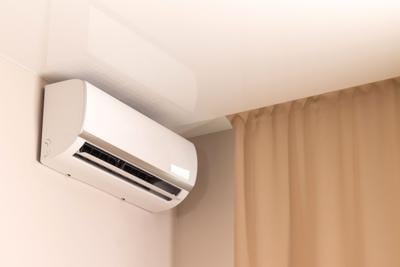
White air conditioner under stretch ceiling in modern room with beige curtains
Few technological advancements have transformed our daily lives as profoundly as air conditioning. What began as a luxury for the wealthy has become an essential feature of modern living, reshaping everything from architecture to work productivity. Today's air conditioning installation represents not just cooling technology, but a complete reimagining of how we inhabit spaces. This article explores the revolutionary impact of modern A/C systems and how they continue to evolve our lifestyles.
From Luxury to Necessity: The A/C Transformation
The journey of air conditioning from novelty to necessity mirrors broader societal changes:
Early 20th Century: Only theaters and wealthy homes could afford A/C units
Post-WWII Boom: Suburban expansion made residential air conditioning installation commonplace
21st Century: Smart systems integrate with home automation for unprecedented control
This evolution didn't just change our comfort levels - it altered where and how we could live. Cities like Phoenix, Houston, and Dubai owe their massive growth directly to reliable cooling technology.
The Hidden Architecture Revolution
Modern A/C systems have fundamentally changed building design:
Glass Skyscrapers became possible with climate control compensating for greenhouse effects
Open Floor Plans replaced compartmentalized rooms thanks to even cooling distribution
Energy-Efficient Materials developed in response to cooling demands
Smart Home Integration allows for zoning and remote temperature control
The typical air conditioning installation today involves complex ductwork and zoning systems that would astonish engineers from just 30 years ago.
Productivity and Health: The Unexpected Benefits
Beyond comfort, modern cooling systems deliver measurable improvements to our lives:
Work Performance: Studies show optimal temperatures increase productivity by 10-15%
Sleep Quality: Proper bedroom cooling contributes to better rest cycles
Health Protection: Advanced filtration systems reduce allergens and pollutants
Safety: Prevents heat-related illnesses during extreme weather events
Modern air conditioning installation now often includes air purification systems, humidity control, and even aromatherapy integration.
The Technology Behind Today's Quiet Revolution
Today's systems bear little resemblance to their noisy, inefficient ancestors:
Inverter Technology: Maintains constant temperature without cycling on/off
Smart Sensors: Adjust cooling based on occupancy and activity levels
Zoned Systems: Allow different temperatures in different rooms
Eco-Friendly Refrigerants: Reduce environmental impact
Ultra-Quiet Operation: Some units operate at just 19 decibels
The latest air conditioning installation projects often incorporate geothermal options or solar-powered systems for maximum efficiency.
Regional Impacts: How A/C Redefined Geography
Air conditioning has literally changed population patterns:
Sun Belt Migration: Enabled mass relocation to warmer climates
Tropical Tourism: Made year-round resort destinations viable
Global Workplace Standards: Created consistent environments worldwide
24/7 Society: Allowed round-the-clock activity regardless of outdoor conditions
Modern air conditioning installation in commercial spaces now often includes sophisticated air exchange systems that maintain ideal conditions for both people and equipment.
The Future of Cooling: What's Next?
Emerging technologies promise to revolutionize cooling further:
Personalized Climate: Systems that adapt to individual body temperatures
Atmospheric Water Harvesting: A/C units that extract drinking water from air
AI Optimization: Systems that learn usage patterns for maximum efficiency
Transparent Solar A/C: Window-integrated cooling technology
Phase Change Materials: Walls that absorb and release heat as needed
The next generation of air conditioning installation will likely focus on complete environmental control systems rather than simple temperature regulation.
Choosing the Right System for Your Needs
With so many options available, selecting the right A/C system requires consideration of:
Space Requirements: Square footage and layout
Climate Factors: Humidity levels and temperature extremes
Energy Efficiency: SEER ratings and smart features
Installation Complexity: Ductwork vs. ductless systems
Future-Proofing: Compatibility with smart home systems
Professional air conditioning installation experts can assess your specific needs and recommend systems that will provide optimal performance for years to come.
Conclusion: Living in the Climate-Controlled Age
The quiet hum of modern A/C systems represents one of civilization's most impactful innovations. From enabling new architectural forms to protecting public health, from boosting economic productivity to making inhospitable regions livable, air conditioning has quietly revolutionized every aspect of modern life.
As technology continues to advance, the air conditioning installation of tomorrow promises even greater integration with our living spaces and lifestyles. What began as a simple machine for cooling air has become an indispensable system for creating ideal living environments - a true revolution that continues to shape our world.



(0) comments
We welcome your comments
Log In
Post a comment as Guest
Keep it Clean. Please avoid obscene, vulgar, lewd, racist or sexually-oriented language.
PLEASE TURN OFF YOUR CAPS LOCK.
Don't Threaten. Threats of harming another person will not be tolerated.
Be Truthful. Don't knowingly lie about anyone or anything.
Be Nice. No racism, sexism or any sort of -ism that is degrading to another person.
Be Proactive. Use the 'Report' link on each comment to let us know of abusive posts.
Share with Us. We'd love to hear eyewitness accounts, the history behind an article.